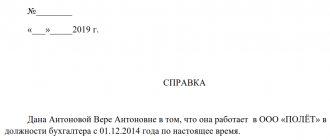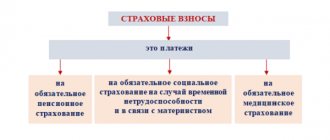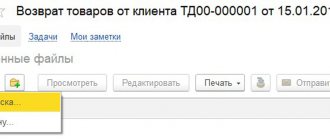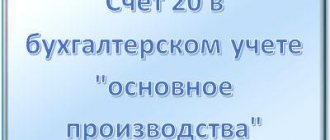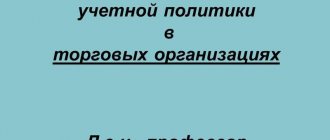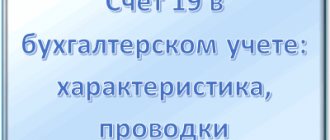Transactions not subject to VAT: complete list
Transactions and goods not subject to VAT for sale (or use for one’s own needs) are collected in a list that is exhaustive and cannot be expanded.
The list is shown in paragraphs. 1–3 tbsp. 149 of the Tax Code of the Russian Federation: I. Activities for the transfer of premises for rent to non-residents (individuals and legal entities) who have received accreditation in Russia (clause 1 of Article 149 of the Tax Code of the Russian Federation). The list of foreign states for whose citizens and/or organizations VAT exemption may be applied is listed in the general order of the Ministry of Foreign Affairs and the Ministry of Finance of Russia dated May 8, 2007 No. 6498/40n.
At the same time, this type of activity also includes operational (utility) maintenance of leased premises on the terms specified above, if this type of service is specified in the lease agreement (Resolution of the Federal Antimonopoly Service of the Moscow District dated April 22, 2010 No. KA-A40/2596-10) .
II. Sale of goods, provision of services, including for one’s own needs, specified in clause 2 of Art. 149 of the Tax Code of the Russian Federation, is also not subject to VAT. The list is quite lengthy - it consists of more than 30 items, but it is worth mentioning them all. Most of the positions listed in this paragraph have a clear socially oriented orientation:
- Medical products (domestic and foreign) in accordance with the list approved by Decree of the Government of the Russian Federation dated September 30, 2015 No. 1042 (taking into account changes made by Decrees of the Government of the Russian Federation dated December 31, 2016 No. 1581, dated November 22, 2017 No. 1404).
These include:
- medical products;
What you need to submit to the Federal Tax Service to obtain VAT exemption for medical products, see the link.
- prostheses and components for them;
- technical equipment (including vehicles) for disabled people;
- glasses and lenses intended for vision correction, frames for such glasses.
- Medical services provided by organizations and individual entrepreneurs engaged in medical activities (except for veterinary and sanitary epidemiological services):
- provided within the framework of insurance policies for compulsory medical insurance;
- prevention, diagnosis and treatment of the population - the list of permitted activities was approved by Government Decree No. 132 dated February 20, 2001;
- collection of blood from the population;
- emergency medical care to the population;
- nursing services;
- pathologist services;
- medical care for pregnant women, newborns, drug addicts and disabled people.
- Services provided to help the disabled, sick or elderly in accordance with instructions issued by medical institutions or social security authorities.
- Supervision and care services provided to minors as part of the implementation of preschool educational programs, as well as conducting classes in children's sections and clubs.
- Food products produced directly in the canteens of medical and educational institutions, or delivered there ready-made. An explanation for this position is contained in the letter of the Federal Tax Service dated October 19, 2011 No. ED-4-3 / [email protected] At the same time, there is a controversial situation in relation to individual entrepreneurs. Thus, the Ministry of Finance believes that individual entrepreneurs cannot take advantage of the fact that this is an activity not subject to VAT (department letter No. 03-07-14/95 dated September 14, 2009). But there is also positive judicial practice for entrepreneurs. In particular, the ruling of the Supreme Arbitration Court of the Russian Federation dated 02/07/2007 No. 649/07.
- Services of archivists (explanations are contained in the letter of the Federal Tax Service of Moscow dated July 3, 2009 No. 16-15/068560).
- Transportation of the population by passenger transport: urban, with the exception of fixed-route and regular taxis, according to uniform, agreed upon (except for contractual (letter of the Ministry of Finance dated 02/05/2013 No. 03-07-07/2476)) tariffs with local authorities (additional explanations are contained in the letter of the Ministry of Finance dated 11/17/2009 No. 03-07-07/75).
- Ritual services (production of monuments, decoration of tombstones, sale of ritual utensils) in accordance with the list approved by Government Decree No. 567 dated July 31, 2001. Moreover, exactly how the word “ritual” should be understood is explained in the letter of the Ministry of Finance dated November 14, 2011 No. 03- 07-07/69.
- Postage stamps, postcards and envelopes (marked), lottery tickets.
- Providing housing of all forms of ownership for use, and, despite the fact that the Ministry of Finance of Russia excludes hostels from this list (letter dated August 22, 2012 No. 03-07-07/88), judicial practice in resolving a possible conflict with the Federal Tax Service is mostly positive (decrees FAS North Caucasus District dated October 3, 2011 in case No. A32-34416/2010, FAS Moscow District dated December 29, 2011 in case No. A40-120210/10-116-467, FAS Volga District dated March 25, 2010 No. A12-3432/ 2009).
- Coins made of precious metals in circulation in Russia or other countries (the status of the coins can be confirmed by clarifications from the Bank of Russia (letters from the Ministry of Finance dated March 17, 2017 No. 03-07-05/15462, dated August 15, 2016 No. 03-07-07/47731)) .
- Shares in management companies of companies, shares in cooperatives and investment funds, securities and financial instruments of futures transactions, as well as:
- depository services (IMF, IBRD, IDA), with the Central Bank of Russia acting as a depository in rubles;
- services provided by specialized organizations on the basis of a license and related to securities.
- Lost force as of 01/01/2019.
- Educational services of non-profit organizations. As for the provision of additional educational services specified in the license, a detailed explanation of the application of tax exemption is contained in the letter of the Ministry of Finance dated June 24, 2014 No. 03-07-R3-30162. Consulting services are not included in the list.
When educational services are subject to VAT and when not, find out from this publication.
14.1. Social services and related services.
- Preservation of cultural and historical monuments, structures, buildings, including conservation, restoration, repairs, etc. (detailed explanations are contained in the letter of the Federal Tax Service dated September 7, 2012 No. AS-20-3/970).
- Work within the framework of the construction of housing, social and cultural facilities, related infrastructure and professional retraining centers for military personnel.
16.1. Services within the framework of arbitration, paid for through a non-profit organization, a division of which is this permanent arbitration institution.
- Services related to the collection of state duties and other types of duties and fees, including:
- services for certification of operators (insurers) for vehicle inspection;
- technical inspection services (details on the application of the exemption are in the letter of the Federal Tax Service dated October 19, 2012 No. ED-4-3 / [email protected] ).
- Duty free goods.
- Goods and services (except excisable) as part of the provision of gratuitous assistance (assistance) to the Russian Federation.
- Services in the field of art and culture (cinemas, planetariums, excursion bureaus, etc., with the exception of aquariums, for which there is an explanation in the letter of the Ministry of Finance dated December 12, 2011 No. 03-07-07/83). In relation to operations for the sale of entrance tickets, there is an explanation in the letter of the Ministry of Finance dated 08/07/2012 No. 03-07-11/259, but additional services are not exempt from VAT (letter of the Ministry of Finance dated 02/04/2013 No. 03-07-07/2235) .
- Production of film products by cinematography organizations, transfer of rights to use these products (additional information is contained in letters from the Ministry of Finance dated December 5, 2012 No. 03-07-11/527 and the Federal Tax Service dated February 13, 2013 No. ED-4-3 / [email protected] ). At the same time, the sale of copies of film products is subject to taxation (letter of the Federal Tax Service of Moscow dated October 18, 2010 No. 16-15/108644). In addition, individual entrepreneurs are not exempt from VAT on this item of goods and services (letter of the Ministry of Finance dated July 29, 2011 No. 03-07-14/79). Also exempt from VAT are the rights to use protected results of intellectual activity used and (or) arising in the creation of film products that have received a national film certificate.
- Services at airports and Russian airspace for aircraft maintenance (details in letter of the Ministry of Finance dated 08/07/2012 No. 03-07-08/242).
- Service in ports of water transport (sea vessels, mixed and inland navigation vessels) during parking (details are in the letter of the Ministry of Finance dated May 18, 2012 No. 03-07-07/52). Only persons who ensure the operation of vessels can provide services - otherwise such services are subject to tax (letter of the Ministry of Finance dated 07/08/2011 No. 03-07-08/210).
- Pharmaceutical services from pharmacies for the production of medicines, repair and production of glasses, hearing aids and orthopedic prostheses.
- From 01/01/2018 this paragraph of Art. 149 of the Tax Code of the Russian Federation has lost force (law dated November 27, 2017 No. 335-FZ). From this date, the sale of scrap and waste of ferrous and non-ferrous metals is subject to VAT. But it will be paid by buyers (except for individuals who are not individual entrepreneurs) - clause 8 of Art. 161 of the Tax Code of the Russian Federation imposes on them the duties of a tax agent for VAT.
- Exclusive (copyright) rights, as well as franchises.
- Expired from 01/01/2017.
- Gambling (services for its implementation).
- Trust management of pension savings of insured citizens.
- Transactions related directly to the assignment of the right to claim obligations under the use of financial instruments for futures transactions, which are also exempt from taxation.
- Lost force as of 01/01/2019. Waste paper is now subject to VAT, but buyers are required to charge and pay the tax.
- Services for the sale by foreign persons of the rights to host the FIA Formula 1 World Championship, advertising services sold by the organization that acquired these rights on the territory of the facility “Track for the Formula 1 series road racing” in Sochi.
- Services for the transfer of medical devices (specified in paragraph 4, subparagraph 1, paragraph 2, Article 149 of the Tax Code of the Russian Federation), having the appropriate registration certificate, under financial lease (leasing) agreements with the right to buy.
- Material assets issued from the state material reserve to responsible custodians and borrowers in connection with their refreshment, replacement and in the order of borrowing in accordance with the Law “On State Material Reserve” dated December 29, 1994 No. 79-FZ.
- Services for the technical management of sea-going vessels and mixed (river-sea) navigation vessels provided to foreign persons who are not registered with the tax authorities as taxpayers and operating sea-going vessels and mixed (river-sea) navigation vessels registered in the ship registers of foreign countries . The list of specified services for the technical management of sea vessels is determined by the Government of the Russian Federation.
- From 01/01/2020 - municipal solid waste management services provided by regional municipal solid waste management operators.
III. Business transactions not subject to VAT, specified in paragraph 3 of Art. 149 Tax Code of the Russian Federation:
- Sale (use for personal needs) of goods of religious significance. The list of such goods is specified in Decree of the Government of the Russian Federation dated March 31, 2001 No. 251.
- Sale (transfer for own needs) of goods (with the exception of excisable goods, mineral raw materials, minerals) produced by public organizations that employ at least 80% of disabled people (detailed information is in the letter of the Federal Tax Service dated March 29, 2011 No. KE-4-3 /4902 @). Moreover, if the organization has set the goal of generating income, then such activities are not subject to tax exemption (Resolution of the Supreme Arbitration Court of the Russian Federation dated September 14, 2010 No. 1814/10). In addition, VAT exemption does not apply if organizations of disabled people use the services of subcontractors (Resolution of the Presidium of the Supreme Arbitration Court of the Russian Federation dated June 14, 2011 No. 16970/10). The same benefit can be applied by organizations whose authorized capital consists entirely of contributions from public organizations of disabled people, provided that the average number of disabled people among their employees is at least 50%, and their share in the wage fund is at least 25%.
- Banking operations carried out by banks (except collection). At the same time, services for the preparation and collection of documents for concluding credit and security agreements do not apply to such operations (letter of the Ministry of Finance dated May 31, 2013 No. 03-07-05/20027). Also exempt from VAT are transactions with bank cards, transactions for the execution of bank guarantees, the issuance of guarantees, etc.
- Processing services. The list of services can also be found in the letter of the Ministry of Finance dated July 18, 2012 No. 03-07-05/21.
- Banking operations that can be carried out without a license from the Central Bank of Russia (details are in the letter of the Ministry of Finance dated March 31, 2010 No. 03-07-05/15).
- Sale of handicrafts that have artistic value, if the samples are registered in accordance with Decree of the Government of the Russian Federation of January 18, 2001 No. 35.
- Operations for the provision of insurance services.
- Conducting lotteries (details on the procedure for applying the exemption are in the letter of the Ministry of Finance dated April 12, 2013 No. 03-07-07/12331).
- Sale of concentrates, ore, scrap, which contain precious metals, to the State Fund of Precious Metals and Stones, from the funds of the constituent entities of the Russian Federation - to international organizations, the Central Bank and other banking institutions (additional information is available in letters of the Ministry of Finance dated May 2, 2012 No. 03-07-05/11 and Federal Tax Service dated 02/08/2013 No. ED [email protected] ).
- Sale of uncut diamonds.
- Sale (use for own and intra-system needs) of goods manufactured by prisoners.
- Free transfer of goods (provision of services) within the framework of charity, with the exception of excisable products (letter of the Ministry of Finance dated October 20, 2011 No. 03-07-07/61). Additional information on the application of the VAT exemption can be found in letters from the Ministry of Finance dated October 26, 2011 No. 03-07-07/66 and the Federal Tax Service of Moscow dated December 2, 2009 No. 16-15/126825.
- Sale of entrance tickets printed on strict reporting forms by sports institutions for their events; provision of use of sports facilities for the above-mentioned events. In this case, the intended purpose of the premises being leased is important (letter of the Ministry of Finance dated November 27, 2013 No. 03-07-07/51187).
- Providing legal services.
- Loan in securities or money (details are in the letter of the Ministry of Finance dated November 2, 2012 No. 03-07-07/113), including clearing services.
- Carrying out research and development work, paid from the budget and special funds (letters of the Ministry of Finance dated January 18, 2017 No. 03-03-06/3/1931, Federal Tax Service of Russia dated November 18, 2016 No. SD-4-3 / [email protected] contain requirements for submission of supporting documents).
- Excluded.
- Services of sanatoriums and dispensaries, recreation and health centers for children placed on the territory of Russia, if vouchers are issued on strict reporting forms (more information - in letters of the Ministry of Finance dated 04/18/2016 No. 03-07-07/22314, dated 02/19/2016 No. 03- 07-07/9546,04.02.2010 No. 03-07-11/18).
- Firefighting work in forest areas.
- Sale of own agricultural products (with a share in turnover of at least 70%).
- Excluded.
- Sale of residential real estate (letters from the Ministry of Finance dated 04/10/2017 No. 03-07-14/21073, dated 03/09/2016 No. 03-07-08/128704, dated 05/16/2011 No. 03-07-05/11 and the Federal Tax Service dated 07/17/2012 No. ED-4-3/ [email protected] ).
- Registration of a share in the common right to the property of an apartment building upon its transfer (sale of an apartment), including the services of developers under equity participation agreements (letter of the Ministry of Finance dated March 14, 2011 No. 03-07-10/04 indicates that persons who are not developers and do not receive VAT exemption). Also exempt from VAT are the services of the developer for the DDU.
- Excluded.
- Marketing transfer of goods, if the cost of purchasing one of them does not exceed 100 rubles. taking into account the clarification of the Plenum of the Supreme Arbitration Court of the Russian Federation on the distribution of advertising materials (Resolution No. 33 dated May 30, 2014). See also: “Advertising goods more expensive than 100 rubles - the court allowed not to pay VAT .
- Assignment of the right to claim obligations by creditors.
- Port work provided by SEZ residents.
- Free provision of print space or airtime in accordance with election legislation.
- Provision of public services (additional information - in letters of the Ministry of Finance dated January 23, 2017 No. 03-07-11/2838, dated January 31, 2017 No. 03-07-11/469, dated September 23, 2015 No. 03-07-15/54498, dated 10/22/2012 No. 03-07-07/110 and Federal Tax Service dated 05/28/2010 No. ШС-37-3/ [email protected] ) managing organizations.
- Provision of services for the maintenance of common household facilities in apartment buildings (letters from the Ministry of Finance dated 03/03/2017 No. SD-19-3/ [email protected] , 11/21/2011 No. 03-07-14/112 and the Federal Tax Service dated 06/17/2016 No. SD-3-3 / [email protected] , dated March 15, 2013 No. AS-3-3/904).
- Lost power.
- Free production or distribution of advertising of a social nature (letter of the Federal Tax Service dated November 18, 2011 No. ED-4-3 / [email protected] ).
- Under an investment partnership agreement - services for managing the affairs of (common) partners.
- Transfer of property rights (contributions) under an investment partnership agreement, including the transfer of rights to a participant in such a partnership when allocating his share.
- Sale (transfer for own needs) of breeding livestock and poultry with a breeding certificate.
- Providing agency services for the sale and lease of state property.
- Repair and maintenance services for goods under warranty.
Industries with a large number of fly-by-nights
Along with the signs of dubious clients, the Central Bank also provided in its manual a list of economic sectors in which schemes for obtaining illegal tax benefits involving shell companies are most often found. The regulator identifies the following areas:
- agriculture and trade in timber and construction materials;
- construction and provision of freight transport services by road;
- scope of personnel provision;
- trade in precious metals and stones, jewelry made from them and scrap of such products;
- wholesale trade in scrap metal, including scrap of ferrous and non-ferrous metals.
What VAT-free transactions can be considered benefits?
Due to the fact that taxpayers, when carrying out certain business transactions listed in paragraphs. 1–3 tbsp. 149 of the Tax Code of the Russian Federation, they do not pay VAT, many believe that this is a kind of benefit. But this is not entirely true, because usually only certain categories of entrepreneurs can use benefits, and anyone can carry out VAT-exempt transactions, as long as they have the necessary permits.
However, using the results of the analysis of the Plenum of the Supreme Arbitration Court of the Russian Federation, set out in Resolution No. 33 dated May 30, 2014, we can identify individual operations from Art. 149 of the Tax Code of the Russian Federation, which can be classified as benefits. We are talking about the transfer of goods (services) specified in subparagraph. 5 clause 2, as well as business operations listed in sub-clause. 1, 2, 14 clause 3 of this article of the Tax Code of the Russian Federation.
According to the Ministry of Finance, preferential transactions include the transfer (use for one’s own purposes) of goods or services specified in subparagraph. 5 p. 2 art. 149 of the Tax Code of the Russian Federation (letter of the Ministry of Finance of Russia dated December 3, 2014 No. 03-07-15/61906).
ConsultantPlus experts explained how to reflect the application of the benefit in the VAT return. Get trial access to the K+ system and upgrade to the ready-made solution for free.
Banks' comments
VTB representatives believe that the consequence of the abolition of zero VAT will be a significant increase in the cost of software for banks, which is already a large expense item. “The cancellation of the benefit is premature, and it will really have a negative impact on the banking sector,” bank employees told Kommersant.
In the idea of the Ministry of Telecom and Mass Communications, representatives of Tinkoff Bank saw a potential cause of significant losses for the banking business. They emphasized that the abolition of preferential VAT will be carried out without taking into account modern market realities, and cited as an example the fact that banks have in many ways become IT companies, although they cannot claim benefits in the IT industry.
The Settlement Non-Bank Credit Organization (RNCO) “Payment Center” believes that the abolition of benefits will be followed by a decrease in the volume of software purchases made by banks. This opinion was expressed by member of the board of directors of RNKO Alexander Pogudin , adding that the consequence of this will be a reduction in the income of IT companies.
Otkritie Bank board member Sergei Rusanov called it strange that “IT initiatives, which should be aimed at motivating technology development, underestimate this motivation for a large proportion of consumers, thereby narrowing the market.” Deputy General Director of the Qiwi group Maria Shevchenko called the initiative of the Ministry of Telecom and Mass Communications “critical for banks, if we consider it in conjunction with the initiative to switch banks to using Russian software in accordance with the Presidential Decree.”
If there is an activity that is not subject to VAT and taxable
In the event that an organization, in addition to activities exempt from taxation, is also engaged in other types for which VAT is calculated, it is necessary to maintain separate accounting. This provision is enshrined in paragraph 4 of Art. 149 of the Tax Code of the Russian Federation.
In this case, it is necessary to take into account the input VAT on goods purchased or services received separately (for taxable and exempt activities). The rules for such tax accounting are given in paragraph 4 of Art. 170 Tax Code of the Russian Federation.
For more details, see the material “How separate accounting for VAT is maintained (principles and methods).”
What is typical is that in Chapter 21 of the Tax Code of the Russian Federation there is no clear indication of exactly how separate accounting should be maintained, so enterprises are given the right to establish the methodology for maintaining it themselves. This methodology is enshrined in the company's accounting policy.
Banking services for issuing loans and providing guarantees
These types of banking services have specific features of reflection in accounting. The bank's tariffs for the use of loan funds are called interest on the loan and are reflected depending on the purpose of obtaining the loan in correspondence with cost accounts or are taken into account in the value of the assets for the purchase of which the loan was received. Accounting for short-term loans is kept on account 66, long-term - on account 67. Interest and principal are accounted for separately.
A feature of reflecting bank commissions for providing guarantees is that these costs should be evenly distributed over the entire period of validity of the guarantee.
Conditions for applying VAT exemption
In order to take full advantage of the VAT exemption when carrying out operations listed in Art. 149 of the Tax Code of the Russian Federation, you must have permits. According to the fiscal department, first of all we are talking about a license.
Note that most of those listed in Art. 149 of the Tax Code of the Russian Federation, types of operations can be legally carried out only by obtaining a license. Carrying out such activities without a license not only entails the imposition of financial and administrative sanctions, but is also fraught with additional VAT charges.
The list of licensed types of activities is specified in the Law “On Licensing...” dated May 4, 2011 No. 99-FZ. In accordance with Art. 9 of this law, licenses have an unlimited validity period. They need to be re-registered only in 2 cases:
- if it was issued before November 2011 and the period for which it was issued has expired;
- the name of the type of activity for which the license was issued was changed.
If the license has expired and a new one has not yet been issued, then, according to the tax service, the company loses the right to engage in licensed activities. At the same time, there is judicial practice that is positive for taxpayers, when they have done everything necessary, but the license was not issued due to the fault of government agencies (resolutions of the Federal Antimonopoly Service of the Volga District dated July 7, 2011 No. A55-20211/2010 and the Federal Antimonopoly Service of the Far Eastern District dated April 19, 2010 No. F03-2182/2010).
In addition, in many cases, when carrying out activities exempt from VAT, other permitting documents are required. For example, when selling vital medical products, you will need to provide a registration certificate during a tax audit. When selling components or spare parts for medical devices, such certificates will also be required (letter of the Ministry of Finance of Russia dated February 17, 2017 No. 03-07-14/9027).
At what rate to pay VAT if the registration certificate for a medicine has expired, find out by following the link.
How to prepare for the test
The declarative procedure for VAT refund does not affect the procedure for conducting a desk audit. The verification of your declaration will take place as usual, so you need to carefully prepare for it.
During the inspection process, the inspector may:
— require documents related to the calculation of VAT, as well as confirming tax deductions;
— conduct interrogations of witnesses, including senior officials (manager, chief accountant);
— conduct an inspection of the location of the object on which VAT will be refunded;
— request documents from your counterparties
Thus, before checking, you need to collect all the necessary documents, make sure that they are completed correctly, and also make sure that the deductions are applied correctly. If there are violations of the application of at least part of the deductions, then the amount of the refunded tax will need to be returned with double interest, based on the refinancing rate. It is mandatory to transfer the money back to the budget within five days. After this, the tax authorities will send notifications to the bank about the termination of the provided guarantee. If the company does not return the amount of tax refunded to it on time, then the Federal Tax Service will demand payment from the bank that issued the guarantee.
Intermediaries and VAT-exempt transactions
In accordance with paragraph 7 of Art. 149 of the Tax Code of the Russian Federation the right to take advantage of the VAT exemption when carrying out the activities listed in paragraphs. 1–3 of this article of operations do not apply to intermediaries. That is, if a person carries out such activities in someone else’s interests, then he is obliged to pay the full VAT rate on the amount of his remuneration (letter of the Ministry of Finance of Russia dated March 31, 2010 No. 03-07-05/15 and the Federal Tax Service of Moscow dated July 19, 2010 No. 16- 15/075620).
In this case, the exception is transactions for the sale of goods or the provision of services, which are exempt from VAT on the basis of clause 1, sub-clause. 1 and 8 clause 2, sub. 6 clause 3 art. 149 of the Tax Code of the Russian Federation (based on clause 2 of Article 156 of the Tax Code of the Russian Federation).
For more information on this, see the material “Which intermediary services are not subject to VAT” .
What is a VAT deduction?
At first glance, since VAT must be charged on the sale of goods, works, and services, it is no different from sales tax (turnover). But if we return to its full name - “value added tax”, then it becomes clear that not the entire sales amount should be subject to it, but only the added value . Added value is the difference between the cost of goods, works, services sold and the costs of purchasing materials, raw materials, goods, and other resources spent on them.
This makes clear the need to obtain a VAT tax deduction. The deduction reduces the amount of VAT accrued upon sale by the amount of VAT that was paid to the supplier when purchasing goods, works, and services. Let's look at an example.
Organization “A” purchased goods from organization “B” for resale at a cost of 7,000 rubles per unit. The VAT amount was 1,400 rubles (at a rate of 20%), the total purchase price was 8,400 rubles. Next, organization “A” sells the product to organization “C” for 10,000 rubles per unit. VAT on sales is equal to 2,000 rubles, which organization “A” must transfer to the budget. In the amount of 2,000 rubles, the VAT (1,400 rubles) that was paid during the purchase from organization “B” is already “hidden”.
In fact, the obligation of organization “A” to the budget for VAT is only 2,000 – 1,400 = 600 rubles, but this is provided that the tax authorities offset this input VAT, that is, provide the organization with a tax deduction. Receiving this deduction is accompanied by many conditions; below we will consider them in more detail.
In addition to deducting VAT amounts paid to suppliers when purchasing goods, works, services, VAT on sales can be reduced by the amounts specified in Article 171 of the Tax Code of the Russian Federation. This is VAT paid when importing goods into the territory of the Russian Federation; when returning goods or refusing to perform work or provide services; when the cost of shipped goods (work performed, services provided) decreases, etc.
How to refuse VAT exemption
It may be unprofitable for some companies to take advantage of the VAT exemption when carrying out transactions specified in paragraph 3 of Art. 149 of the Tax Code of the Russian Federation (refusal of VAT exemption for business operations from paragraphs 1 and 2 of this article is impossible). Especially for them, the possibility of refusing such an exemption is provided (clause 5 of Article 149 of the Tax Code of the Russian Federation).
For more information, see: “How to refuse VAT exemption” .
You can write a waiver of VAT exemption for one transaction or for several, provided for in different subclauses or within one of them. In this case, the requested period must be at least one year.
You can waive your right to apply tax exemption by sending an application to the territorial Federal Tax Service. The application is drawn up in any form. In this case, it should be done before the 1st day of the month of the tax period in which the company plans to stop using these privileges (taking into account the recommendations set out in the letter of the Federal Tax Service of the Russian Federation dated 08.26.2010 No. ШС-37-3/10064).
For an example of such a statement, see the material “Sample application for refusal of VAT exemption” .
Refusal of the benefit gives the right to apply a deduction of input VAT.
See, for example, “You can apply a VAT deduction when distributing advertising materials worth up to 100 rubles .
VAT under simplified tax system
Although simplifiers are not VAT payers, issues related to this tax nevertheless arise in their activities.
First of all, why do OSNO taxpayers not want to work with suppliers on the simplified tax system? The answer here is that the supplier on the simplified tax system cannot issue an invoice to the buyer with allocated VAT, which is why the buyer on the OSNO will not be able to apply a tax deduction for the amount of input VAT. The solution here is possible in reducing the selling price, because unlike suppliers on the general taxation system, simplifiers do not have to charge VAT on sales.
Sometimes simplifiers still issue the buyer an invoice with a allocated VAT, which obliges them to pay this VAT and submit a declaration. The fate of such an invoice may be controversial. Inspections often deny buyers a tax deduction, citing the fact that simplifiers are not VAT payers (even though they actually paid VAT). True, most courts in such disputes support the right of buyers to deduct VAT.
If, on the contrary, a simplifier buys goods from a supplier working on OSNO, then he pays VAT, for which he cannot receive a deduction. But, according to Article 346.16 of the Tax Code of the Russian Federation, a taxpayer using a simplified system can take into account input VAT in his expenses. This, however, only applies to payers of the simplified tax system Income minus expenses, because On the simplified tax system, income does not take into account any expenses.
Results
So, an exhaustive list of business transactions that are exempt from VAT is contained in paragraphs. 1–3 tbsp. 149 of the Tax Code of the Russian Federation. All taxpayers who have the necessary permits can use the right to tax exemption in accordance with this article. However, a license is required only when carrying out activities that are subject to licensing.
There are restrictions when performing intermediary activities: in most cases, intermediaries are deprived of the right to take advantage of the VAT exemption (more details are provided in paragraph 7 of Article 149 of the Tax Code of the Russian Federation).
If the taxpayer considers that it is unprofitable for him to use the VAT exemption (for example, when the VAT accepted for deduction exceeds the amount of the tax paid), he can waive his right for a period of more than a year on the basis of clause 5 of Art.
149 of the Tax Code of the Russian Federation. You can find more complete information on the topic in ConsultantPlus. Free trial access to the system for 2 days.

